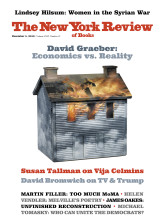It’s the eleventh
hour on the eleventh
floor. We chose this
apartment (if not
this hour) for the light,
though my father could,
from any height, look
back. Below are oaks
and magnolias and tracks
on which freight and passenger
trains pass, and my father
knows the difference by
the blowing of their horns,
both of which he prefers,
he says, to that other one
he’s hearing, by which he
means Gabriel’s, disguised
as tinnitus. He’s remembering also,
since it’s fall, the shofar Herb
Karp blew for the new year—
a sorrowing sound, he
always said, especially if
you were a ram. That
day we moved him
from the split-
level to the eleventh
floor, we brought a few
photographs and chairs,
lamps to see the
dark with, spoons,
a cup. It was a kind
of sky burial. He
has his pocket comb.
He has his wristwatch
with the busted strap,
he has his wallet
with a dollar. He’s getting
smaller and smaller, his vast
past vaster. Looking out
from the eleventh hour
is like looking from
a hole punched to make
a room into a camera
obscura. Anything can
be a camera. Anyone
might be in this aerie,
but today it’s us, watching
on the compact TV what
he watched, rapt
at the Imperial Theatre
in 1936—Buster Crabbe
as Flash Gordon, trying
to stop the planet Mongo
from colliding with Earth.
I forget how it ends, my
father says, but it ends.
And then we’re looking
from the small screen out
the sliding glass toward
dusk, where below us,
on fluted, Spanish roofs,
two men in straw hats
are ambling the inclines
of tiles without ropes
or harnesses, without
fear. One man is tossing
bottles of water to the other,
who’s smoking a cigarette
and catching the bottles,
and I’m thinking danger
and OSHA and laborers
in the vineyard and my
father from his eleventh
hour says, Lucky devils.
This Issue
December 5, 2019
Against Economics
‘I Just Look, and Paint’
Megalo-MoMA



